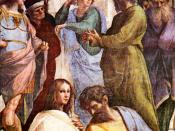In The Republic of Plato1, Socrates provides us with a profound thought-process for expanding one's mind and knowledge. Its purpose is to seek truth and clarity. His method seems to be as effective in current times as once proposed by Socrates. Often, his starting point is asking inquiring questions that arise from his interlocutor's belief on a given subject. They both enter a maze and as they exit, the interlocutor's position is weakened. Simultaneously, Socrates' investigation increases the interlocutor's knowledge. The Socratic method of questioning, paradoxically, demonstrates that knowledge increases when a belief is weakened. This attempts to erode dogmatic concepts by introducing a specific genuine inquiry, rather than simply accepting the Athenian rule
Socrates was not able to inculcate this thinking into the Athenian mind. Sadly, his philosophic methods were thought to be corrupting the youth. This fear was so grand that he was put to death. He does, however, demonstrate his philosophy of thought very eloquently in The Republic of Plato by applying a thought process which we will see later.
This process leads him to question meanings and apply definitions as a foundation for developing proof. He ponders upon the visible and the invisible conditional factors that create reality and truth. There's a genuine interest for clarity by thinking about the underlying implicit order of what is truth. Socrates draws between his own abilities and the abilities of the respective interlocutor. Listen to Socrates in book V, he would like Glaucon to consider what is knowledge:
477 aSince knowledge depended on what is and ignorance necessarily on what is not, mustn't we also seek something between ignorance and knowledge that depends on that which is in between, if there is in fact any such thing?
Here, Socrates presupposes a distinction between knowledge and belief. He begins...



Very interesting
Quite an interesting topic and since I don't have a considerate amount of knowledge on the subject matter I can't really give points on how to improve content matter.
I can say however that this was well written and you put forward your standpoint very well.
0 out of 0 people found this comment useful.